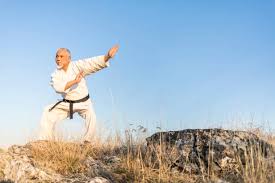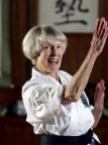“Population ageing is a triumph of humanity, but also a challenge to society”

It is generally accepted that we suffer a decline in physical and cognitive abilities as we age. The study that inspired this article undertook to prove that Karate training can assist in improving our declining cognitive abilities, strength, balance and flexibility.
The Benefits of Movement
Improved physicality will lower the risk of falls and so lessen the occurrence, if not cease the risk of associated injuries. Additionally I believe that the act of participating in a group activity brings many psychological and emotional benefits such as decreasing loneliness, isolation and depression.
About the Study
The study itself comprised of 89 men and women with an average age of 70 years old. The participants were generally in good health when they started.
The controlled group where tested at 5-month and 10-month intervals. Results showed an improvement at the five-month stage, and further increased improvements were noted at the 10-month mark. Researchers suggest that continued practice would continue to show benefits in minimizing the general aging decline found in non-practicing people.
“Active ageing is the process of optimizing opportunities for health participation and security in order to enhance quality of life as people age. Active ageing depends on a variety of influences or determinants that surround individuals, families and communities”
Why Karate?
Karate training by its nature is wide and varied and so the benefits are far reaching. Young people are often brought to karate classes for reasons revolving around discipline, attention building, anti-bullying strategy formation, self-defense, and finally fitness. Fitness, strength building or flexibility are usually not the reasons that young people start karate training. Physical strength and flexibility are often a given for the young. As we age the table turns, mentally we become stronger, less afraid of confrontation and more suited to stand up for ourselves, but we see a physical decline as we age, regardless of our exercise prowess.
My Karate
After over 20 years of training Karate ( I started at the age of thirty) I am glad to say that even while I am not an outstanding talent, I am if nothing else diligent in my practice. I attend regular training at our dojo and participate as much as possible in the warm up, drills, kata. The result of this training means that I can do many things that other woman my age can find difficult. I am strong, in both body and mind, most of the time. Sometimes inflammatory arthritis takes over and robs me of the best of myself. But even in these times I find a more refined practice to be beneficial in lessening my recovery time and generally keeping down times to a minimum. I believe that continuing to practice Karate will help me to stay active into a ripe old age.

What does Karate Training involve?
A typical class will involves a short meditation, a warm up, stretching, drills, partner work, kata, more stretching, a final short meditation.
Six improvements to be by Karate training for all participants.
- Balance – strength and improvement of cognitive ability.
- Flexibility – repetition of movements to extension through warmup and cool down
- Strength – gained from stances, and joint repetition of movements
- Learning a new skill – builds memory and learning muscles.
- Co-ordination – kata and drills
- Cognitive improvement – kata and drills.
Age is not a barrier to participation, Karate training by its nature can be tailored to suit any age group, health condition, size of body, and general physical and mental abilities. Karate is not a team sport, it is self-paced and your journey is not dependent on someone else’s progression just as theirs is not dependent on yours.
A tailored made training program can easily be made to suit an older student without diminishing the heart of Karate. Karate itself is about the art of self-defense, the first line of self-defense is against your own body’s dis-ease and decline. Karate by design is suited to assist with many issues brought about by aging and this will probably be easier for a new student over fifty years old to accept than a student that trained in a dynamic style when they were younger. If you are coming to karate as a new student in an older body you soon learn to let go of any ego that demands you perform beyond your capabilities.
How old is too old to start?
You are never too old to start learning Karate. Karate will meet you where you are.
Contact us here to find out about our classes at the dojo, private classes or if you would like us to tailor a program for your group.
Material References and Quote Sources.
-
- (WHO 2002 Active Aging: A policy Framework. Geneva)
-
- WHO 2002 Active Ageing
-
- WHO Global Report on Falls Prevention in Older Age; By World Health Organization
-
- WHO 2002 Active Aging.
-
- Journal of Sport and Health Science, Volume 5, issue 4, Dec 2016, p484-490 KerstinWitteaSiegfriedKropfbSabineDariuscPeterEmmermacheraIrinaBöckelmann
-
- S.M. Gregory, B. Parker, P.D. ThompsonPhysical activity, cognitive function, and brain health: what is the role of exercise training in the prevention of dementia?Brain Sci, 2 (2012), pp. 684-708








is there a geriatric group near bayswater / morley in W.A
LikeLike
Hi Eric, you should find that any good club will be able to adjust their training to suit all challenges while still providing a well round training experience. You could try searching up clubs on the West Australian Karate Federation page at https://www.karatewestaustralia.com. However if you fancy a drive we run classes in Harrisdale, Kwinana and Baldivis. Best of luck with your training.
LikeLike